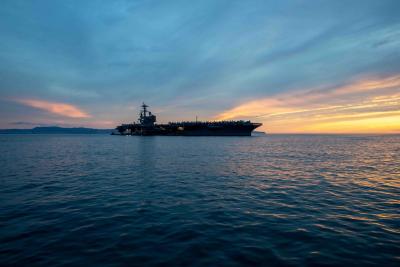NATO alarmed by Russian action in Mediterranean

NAPLES – The United States aircraft carrier George H.W. Bush dropped anchor in the Gulf of Naples, after the commander of carrier strike group 10, Dennis Velez, recounted to carrier captain David Pollard the “numerous contacts” with Russian forces, US military sources reported. The exchange between Velez and Pollard was regarding an incident between U.S. and Russian forces in late October that had alerted NATO in Trieste where the U.S. Sixth Fleet was docked.
The U.S. armed forces newspaper, “Stars and Stripes,” reconstructed the October incident, describing it as, “a long-range Moscow air force reconnaissance aircraft behaving in an ‘unprofessional manner’ with provocative manoeuvres. It was unclear whether the Russian scout plane was aimed directly at the flagship or the ones escorting it.”
The incident between the military giants occurred in the central Mediterranean international airspace, where dispatches of Backfire and Bear bombers are frequent. It was reported by both Italian and U.S. media that in the skies above Tartous, Moscow’s stronghold in Syria, activity from Western radar planes has been unusually intense and active. Military international waters of the Mediterranean have been more under more scrutiny by surveillance forces than ever due to the Ukrainian conflict.
In September, the Russian oceanographic research ship, Akademik Ioffe, arrived in the Strait of Gibraltar, directly in the crosshairs of the Atlantic Alliance, presumably, as reported by Italian newspaper “Repubblica,” “not for research purposes, but rather aimed at studying submarine cables and conduits.” Also in September, the British Royal Navy deployed ships to follow the Russian ships while it crossed the English Channel, suspicious of its activities in the waters.
Germany and Norway have also intervened, becoming involved in the surveillance of the western waters. Both countries announced that they will launch an internationally coordinated initiative to better ensure the security of underwater infrastructure. The recent activity between the U.S. and Russia in the Mediterranean spurred Norwegian Prime Minister, Jonas Ghar Støre, to comment, “we are convinced that efforts at the international level should be better coordinated. NATO is suited in the skills for maritime presence.”
The leaders of the respective countries announced that Berlin and Oslo intend to send a “clear message to the outside world,” regarding the strengthened surveillance and security against Russia that will be employed.
The recent bustling military activity in the international waters of the Mediterranean was a concern to NATO, which said that increased surveillance will continue.
gs
© COPYRIGHT ITALIAN INSIDER
UNAUTHORISED REPRODUCTION FORBIDDEN


